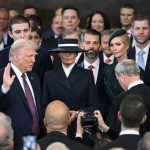WASHINGTON – The US has said that it seeks collaboration with a strong and prosperous Pakistan, rather than with a political party or candidate.
A representative for the US Department of State similarly declined to speculate on the implications of the current political turmoil on the safety of Pakistan’s nuclear assets during a Thursday afternoon press conference in Washington.
“I’m not going to speculate on it.” When asked whether Washington was concerned about the safety of Pakistan’s nuclear weapons, Spokesperson Vedant Patel said, “That is something internal to Pakistan.”
The present political situation in Pakistan is often discussed in briefings and hearings in Washington, including those held by the White House, Congress, the State Department, and think tanks.
The State Department declines to speculate on the implications of the political upheaval on the safety of N-assets.
It was also mentioned during an IMF briefing on Thursday, when Spokesperson Julie Kozack was asked whether the IMF was concerned about the crisis’s effect on the country’s already struggling economy.
Mr Patel was particularly questioned about the assaults on military offices and houses earlier this week at the State Department meeting. “We continue to closely monitor the situation in Pakistan, and as the United States has previously stated, we do not have a position on one candidate or one political party versus another,” he answered.
“What we want is a safe, secure, and prosperous Pakistan.” “It’s in the best interests of US-Pakistan relations,” he remarked.
In response to another query on reopening internet services in Pakistan, which were shut down earlier this week, the US official reminded that Secretary of State Antony Blinken had addressed the subject during a recent briefing.
He also said that the internet was required for people to “communicate with one another, make informed decisions, hold government officials accountable, and exercise their freedom of expression.”
Mr Patel disagreed with a journalist who said that the United States was hesitant to intervene in the disagreement between the Pakistani government and Imran Khan.
“I would reject the premise of your question,” he said. “That is correct; we do not have a preferred candidate or political party, not only in Pakistan, but in any government system around the world.”
Referring to previous briefings at the White House, Mr Patel said that his White House colleagues were correct that “a prosperous and strong, democratic Pakistan is critical to US interests.” That is still the case.”
However, in several of these areas, such as press freedom and human rights, he continued, “we have consistently raised these issues with our counterparts not just in Pakistan but in other countries.”
In Pakistan, Mr Patel said that “the United States is… looking to continue to strengthen economic ties between our two countries by expanding private sector trade and investment.”
“There is also significant security collaboration, as well as areas of collaboration on renewable energy, addressing the climate crisis, increasing agricultural trade, and a variety of other areas.”
Mr Patel said, in response to a query on Pakistan’s involvement in Afghanistan, that “Pakistan continues to be an important partner in the region — an important trade partner, an important security partner.”

